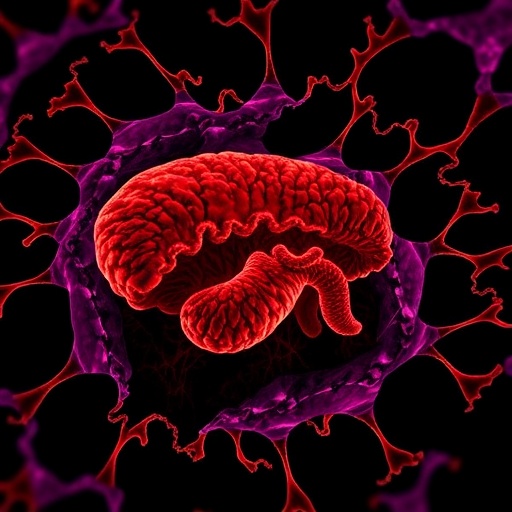A groundbreaking study from the University of Iowa has illuminated a previously unrecognized vulnerability in Malignant Peripheral Nerve Sheath Tumor (MPNST), a rare and relentlessly aggressive form of childhood cancer. Researchers uncovered that MPNST cells critically depend on a specific metabolic pathway to survive and propagate. This metabolic Achilles’ heel could pave the way for novel, targeted therapies capable of improving outcomes for patients, particularly those battling metastatic forms of the disease which, until now, have defied effective treatment.
MPNST primarily afflicts teenagers and young adults and represents one of the most difficult pediatric cancers to treat. These tumors exhibit rapid proliferation and a notorious tendency to metastasize, complicating therapeutic interventions. Conventional treatments, including surgery, radiation, and chemotherapy, often fall short, especially for advanced disease stages characterized by metastasis — the leading cause of mortality in MPNST patients. The pressing need for innovative therapeutic strategies has driven scientists to probe deeper into the disease’s molecular underpinnings.
Focusing on the metabolic dependencies of MPNST cells, the research team led by Dr. Eric Taylor and Dr. Rebecca Dodd embarked on a comprehensive investigation using cutting-edge gene editing and multi-omics methodologies. By harnessing CRISPR-Cas9 technology, they engineered preclinical tumor models that faithfully replicate the mutational landscape seen in human MPNST patients. These sophisticated models allowed them to map the intricate metabolic circuitry fueling tumor growth with unprecedented precision.
The extensive genomic and metabolomic profiling illuminated the pivotal role of the Pentose Phosphate Pathway (PPP) in MPNST biology. This pathway, an alternative glucose metabolic route, serves to generate nicotinamide adenine dinucleotide phosphate (NADPH), a crucial reducing agent that sustains the cellular antioxidant capacity. In MPNST cells, the PPP acts as a metabolic safeguard against oxidative stress, enabling cancer cells to neutralize reactive oxygen species and survive in hostile microenvironments laden with oxidative damage.
Disruption of the PPP, achieved through targeted inhibition of key enzymatic components, significantly impaired the tumor cells’ ability to manage oxidative stress. This metabolic interference culminated in slowed tumor growth rates and heightened sensitivity to chemotherapeutic agents, exposing a synergistic therapeutic vulnerability. The research provides compelling evidence that leveraging PPP inhibition could synergize with existing therapies to enhance treatment efficacy against MPNST.
This discovery distinguishes itself as the first direct linkage of PPP metabolism to MPNST tumor progression. “Our findings uncover a metabolic dependency that has, until now, remained unappreciated in this tumor type,” Dr. Dodd explains. “Targeting this pathway is a novel strategic angle that could drastically reshape therapeutic approaches for patients, especially those with advanced disease where options are currently limited.”
Integrating Dr. Dodd’s expertise in cancer biology with Dr. Taylor’s specialization in metabolic regulation, the study exemplifies a collaborative approach merging diverse scientific disciplines for transformative cancer research. Key contributions from graduate student Gavin McGivney underscore the potential for next-generation researchers to drive breakthroughs in tumor biology and metastasis.
In addition to the core University of Iowa team, the research forged partnerships with prominent cancer centers including Washington University School of Medicine, MD Anderson Cancer Center, and the University of Toronto. Such multi-institutional collaborations enrich the scope and translational potential of the findings, expanding the horizon for clinical exploration.
The investigators harnessed cutting-edge tools such as CRISPR-driven somatic tumorigenesis models and multi-omic analyses combining genomics and metabolomics. These approaches enabled a deep molecular characterization that translated into mechanistic insights, providing a blueprint for how metabolic interventions might be rationally designed and tested in preclinical and eventually clinical settings.
Funding support from prominent organizations such as the Children’s Tumor Foundation, the NIH, the American Heart Association, and the U.S. Department of Defense underpinned the study’s comprehensive nature. The breadth of funders reflects the study’s multidisciplinary impact spanning cancer biology, metabolism, and therapeutic innovation.
Beyond identifying a new metabolic vulnerability, this research also opens avenues for the development of PPP inhibitors and metabolic modulators that could be integrated with standard chemotherapy regimens. Such combination therapies hold promise for overcoming resistance mechanisms and improving patient survival rates in this formidable pediatric cancer.
The study’s publication in Science Advances underscores its significance as a high-impact contribution to oncology and metabolism research. Importantly, it sets a precedent for exploring tumor metabolism in other refractory cancers, signaling a paradigm shift toward metabolically informed, precision oncology therapies that target cancer-specific metabolic adaptations.
This pioneering work not only advances understanding of MPNST’s molecular drivers but also invigorates the search for translation-ready therapeutic strategies that could soon be evaluated in clinical trials, offering new hope to patients and families grappling with this devastating disease.
Subject of Research: Animals
Article Title: Somatic CRISPR tumorigenesis and multiomic analysis reveal a pentose phosphate pathway disruption vulnerability in MPNSTs
News Publication Date: 13-Aug-2025
Web References:
https://www.science.org/doi/10.1126/sciadv.adu2906
Keywords:
Cancer, Cancer metabolomics, Neurofibromatosis, Sarcoma, Gene editing




